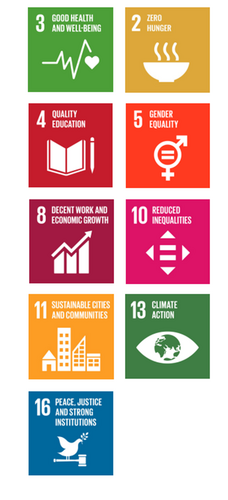Ahead of COP26, the Physical Activity and Health group reflect on how their research, knowledge exchange, capacity building, and technology transfer activities support the achievement of the Sustainable Development Goals.
Physical activtiy levels are lower than recommended across the globe, from early life until old age. Insufficient physical activity is a major and increasing cause of poor physical and mental health, disability, and premature death in countries all over the world.
In 2019 the World Health Organization documented facts and figures related to physical activity and the Sustainable Development Goals. It highlighted the importance of physical activity in supporting the achievement of a number of the Sustainable Development Goals.
Increasing levels of physical activity globally is central to achieving nine of the 17 Sustainable Development Goals.
The World Health Organization recognises increased physical activity as a ‘best buy’ in the global prevention of non-communicable diseases (obesity, diabetes, heart disease, stroke, dementia, some cancers). The role that physical activity and health has beyond good health and well-being is less well known. Perhaps this is because the discipline of physical activity and health is relatively new. The International Society for Physical Activity and Health drove the 2016 Bangkok Declaration. This consensus statement called for urgent prioritisation and implementation of effective national population-based strategies to reduce physical inactivity and contribute to achieving Sustainable Development Goals.
Physical Activity and Health at the University of Strathclyde is one of the few global academic groups with the expertise in physical activity and health to use research, knowledge exchange, capacity building, and technology transfer activities to support the progress towards multiple Sustainable Development Goals here in Scotland and globally.
A number of recent and ongoing activities from our academic staff in support of the Sustainable Development Goals are included below.
SDG 2.2 End All Forms of Malnutrition
- Reducing childhood obesity using nuclear techniques to design interventions ROUND-IT Africa (International Atomic Energy Agency funded 2012-2018) is a 13-country African consortium, with leadership of cross-Africa data-pooling coming from the Physical Activity and Health group at the University of Strathclyde.
- Global impact: our academics contribute to the development of international guidelines and strategies for prevention of childhood obesity Professor Reilly was the sole UK member of the development group for the World Health Organization’s Guidelines on physical activity, sedentary behaviour and sleep for the under 5s. He also sat on the development group for the seminal WHO Ending Childhood Obesity Report 2016.
SDG 3.4 Reduce Premature Mortality for Non-Communicable Disease
- Our academics were heavily involved in developing the UK and international guidelines for physical activity from birth to old age (Reilly, Hughes, Janssen, Mavroeidi).
- Our research has informed guidelines targeted specifically at prevention and management of non-communicable diseases (Kirk).
- These guidelines have informed global strategies and implementation plans for the promotion of physical activity.
SDG 4.4 Inclusive and equitable quality education and lifelong learning for all
- Our BSc in Sport and Physical Activity consistently meets the University strategic aim of widening access and inclusion with ~25% of our undergraduate entrants coming from SIMD 0-40.
- Delivery of seminars via Strathclyde's Age Friendly Academy and the University of Third Age, to reach audiences regardless of age or stage in life (Mavroeidi) as part of the University's commitment to being a 5-95 university.
SDG 10 Reduce inequalities
- Delivery of continuing professional development courses on the assessment of physical activity and sedentary behaviour in 11 low and middle income countries (Janssen, for projects funded by the International Atomic Energy Agency).
- Leadership activities within the capacity building and strengthening cross-cutting theme (Harrington) in a newly funded NIHR Global Health Research Group on cardiometabolic health in Africa.
SDG13 Climate action
- Plans to use innovative pedagogy to embed the links between sport and physical activity with climate change and sustainability into classes across all four BSc in Sport and Physical Activity year groups (McMichan, Harrington).
